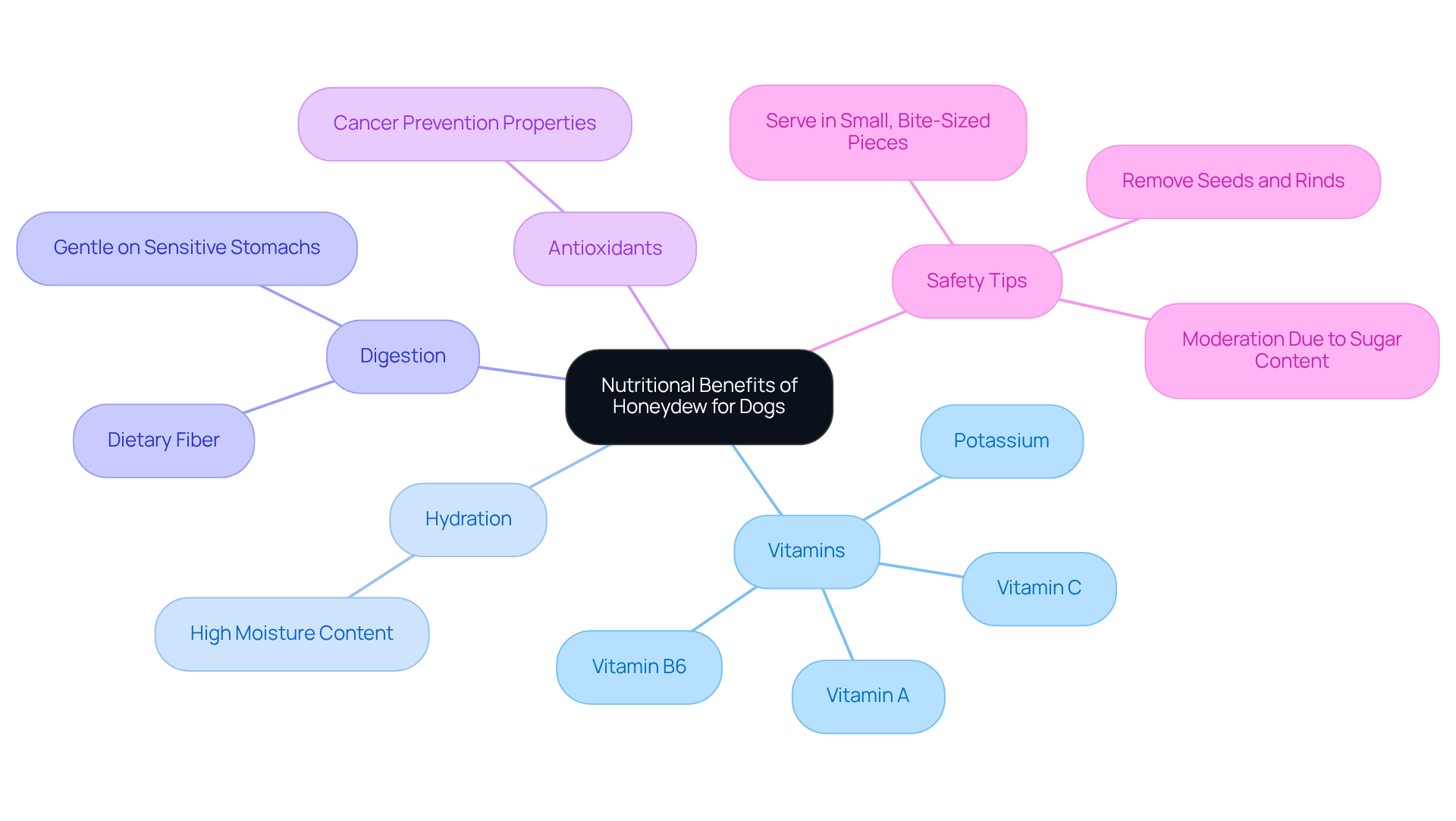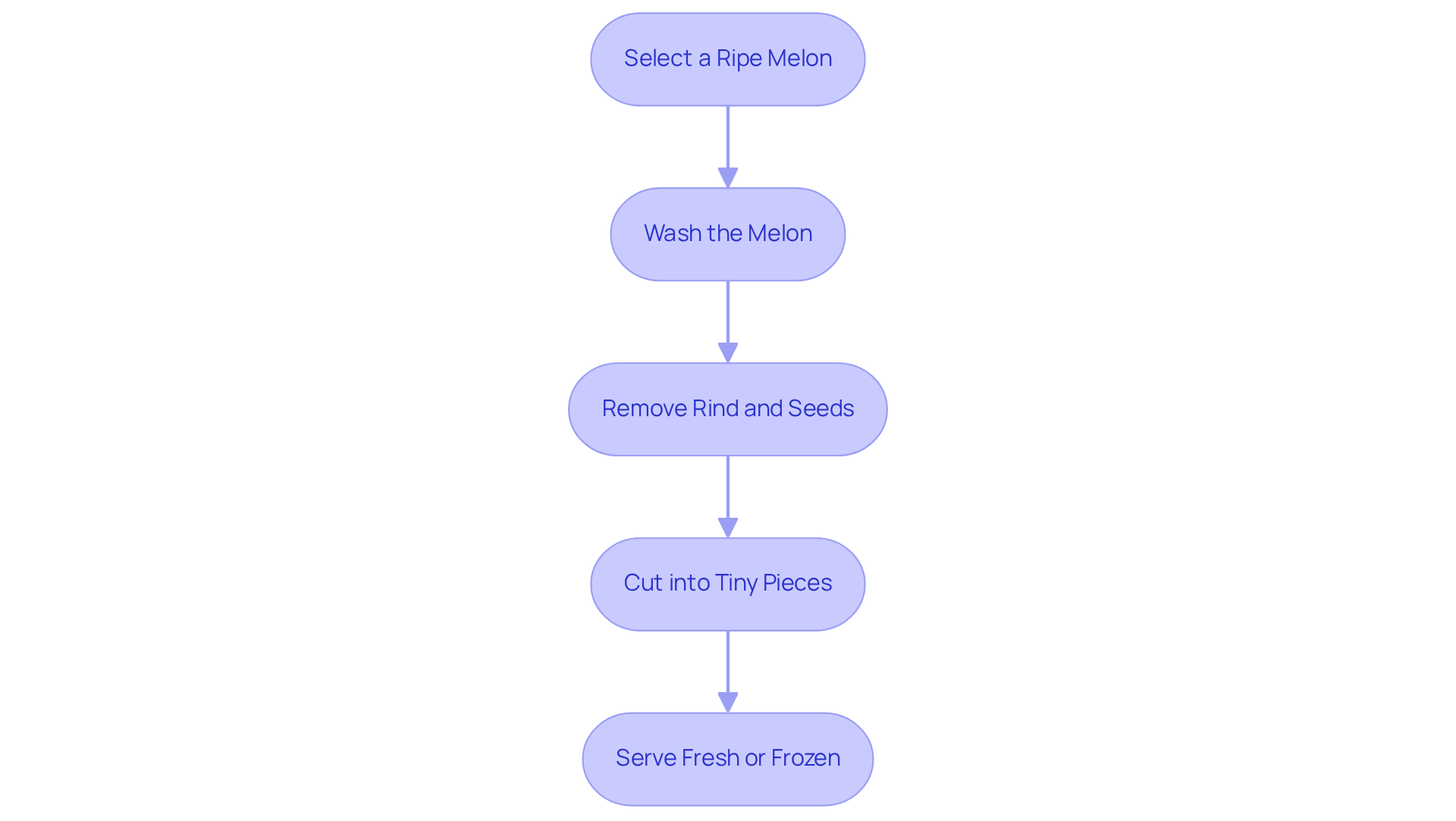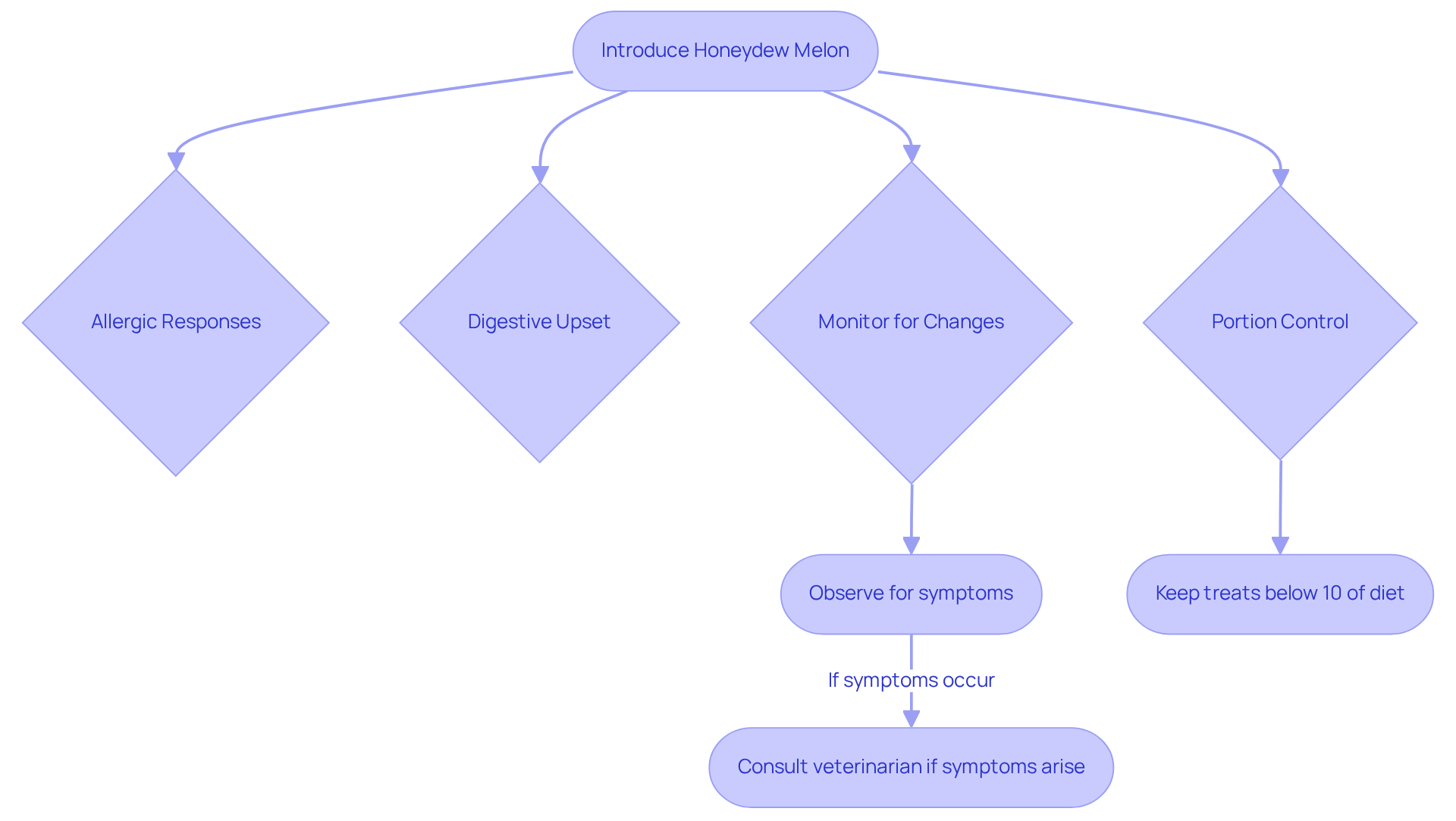
Can Dogs Eat Honeydew? Safe Preparation and Benefits Explained
Overview
As a loving pet owner, you want to ensure that your furry friend enjoys safe and nutritious treats. Honeydew, when prepared properly, can be a delightful addition to your dog’s diet, offering hydration, essential vitamins, and dietary fiber.
It’s important to serve this sweet fruit in moderation, taking care to remove the seeds and rinds. By doing so, you can help prevent any adverse reactions, allowing your dog to enjoy this treat safely.
Always keep an eye on how your pup responds, as each dog is unique and may have different sensitivities. Your attentiveness not only shows your care but also ensures that your dog has a safe and enjoyable experience.
Introduction
Honeydew melon, with its sweet, juicy flesh and high water content, offers a delightful treat for our beloved dogs. As pet owners, it’s natural to wonder: can dogs eat honeydew? This hydrating fruit is not only rich in essential vitamins and minerals, but it also brings potential health benefits, such as:
- Aiding digestion
- Providing antioxidants
Yet, we must consider how to safely introduce this tasty snack to our furry companions, ensuring their comfort and well-being without risking any digestive upset or allergic reactions. By exploring the nutritional advantages and safe preparation methods, we can confidently share honeydew with our dogs, allowing them to enjoy this refreshing treat while minimizing any potential risks.
Understand the Nutritional Benefits of Honeydew for Dogs
Honeydew melon is a wonderfully hydrating fruit that offers numerous nutritional benefits for our beloved canines, which brings up the question: can dogs eat honeydew? It is packed with essential vitamins A, B6, C, and potassium, all of which play a vital role in maintaining a dog’s overall health. The high moisture content in this sweet treat helps keep our furry friends hydrated, especially during those hot summer days when they need it most. Additionally, honeydew melon contains dietary fiber, which supports digestion and fosters a healthy gut, making it a gentle option for dogs with sensitive stomachs. Its ease of digestion is a comforting thought for pet owners who worry about their dog’s dietary needs.
Moreover, this delightful fruit possesses antioxidant properties that may help in cancer prevention, further enhancing its nutritional profile. However, it’s important to remember to offer this sweet snack in moderation due to its natural sugar content, as excessive consumption can lead to weight gain or digestive discomfort. To ensure your dog’s safety, always serve honeydew melon in small, bite-sized pieces, and be sure to remove any seeds and rinds, as they can pose a choking hazard.
Before introducing any new foods into your dog’s diet, including this refreshing melon, it’s important to ask, can dogs eat honeydew, and consult with your veterinarian. They can provide guidance tailored to your pet’s specific needs, ensuring that your furry companion enjoys the best possible care and nutrition.

Prepare Honeydew for Safe Serving to Your Dog
To safely serve honeydew to your beloved dog, it’s essential to follow these best practices with care and attention:
- First, select a ripe melon. Choose a firm melon that is free from blemishes to ensure its freshness and quality. This small step can make a significant difference in your pet’s enjoyment.
- Next, wash the melon gently. Rinse the fruit under cool water to eliminate any dirt or pesticides that could be harmful. Your dog deserves the best, and this simple act shows your commitment to their health.
- Then, remove the rind and seeds with caution. Cut the melon in half and scoop out the seeds, which can pose a choking hazard. It’s also important to cut away the tough rind, as it can be difficult for dogs to digest. This care in preparation helps prevent any potential issues.
- After that, cut the melon into tiny pieces. Slice the melon flesh into small, bite-sized cubes to prevent choking and facilitate easier consumption. Dr. Hilary Jones, cofounder and chief veterinary officer, emphasizes that the fruit should be cut into tiny pieces, ensuring the seeds and rinds are removed. This thoughtful approach makes it safe and enjoyable for your furry friend.
- Finally, serve the melon fresh or frozen. You can offer the melon fresh or freeze the pieces for a refreshing treat on hot days, ensuring they are small enough for your dog to handle comfortably. This versatility adds to the joy of sharing this nutritious snack.
With honeydew containing over 90% water, many wonder can dogs eat honeydew as a highly hydrating snack for canines. However, it’s important to serve it in moderation, as excessive consumption can lead to gastrointestinal upset, which raises the question of whether can dogs eat honeydew. By following these steps, you can provide a nutritious and hydrating treat that enhances your dog’s diet while minimizing any risks. Your attentiveness to their needs reflects the deep bond you share, ensuring they feel loved and cared for.

Recognize Risks and Monitor Your Dog’s Reaction
While this melon is generally safe for our beloved canines, it’s essential for pet guardians to remain vigilant about potential risks when asking if can dogs eat honeydew. Here are some key considerations to keep in mind:
-
Allergic Responses: Some dogs may develop sensitivities to unfamiliar items, including melon. Symptoms can manifest as itching, swelling, or gastrointestinal distress. It’s important to note that approximately 7.6% of dogs experience dietary allergies, and a 2018 State of Pet Health Report indicates that these allergies affect only 0.2% of dogs. This underscores the need for careful observation when introducing any new treat to your dog’s diet.
-
Digestive Upset: Overindulging in this sweet fruit can lead to diarrhea or stomach discomfort. Many commercial pet products are carbohydrate-heavy, which can contribute to allergies. To mitigate risks, consider introducing melon gradually and in small portions while also asking, can dogs eat honeydew, and closely monitoring your dog’s reactions.
-
Monitor for Changes: After your dog tries melon for the first time, take the time to observe them for at least 24 hours. Look for any signs of discomfort or adverse reactions. If symptoms such as vomiting or diarrhea arise, it’s crucial to consult your veterinarian without delay. Veterinary professionals often suggest conducting elimination diet trials to effectively identify food sensitivities.
-
Portion Control: Due to its natural sugar content, this fruit should only make up a small fraction of your dog’s daily caloric intake. To ensure balanced nutrition, it’s important to consider if can dogs eat honeydew and to keep treats, including honeydew, below 10% of their overall diet. By being mindful of portions, you can help maintain your dog’s health and well-being.

Conclusion
Honeydew melon can be a delightful and nutritious treat for dogs, offering hydration and essential vitamins that contribute to their overall health. As a caring pet owner, understanding how to safely incorporate this fruit into your dog’s diet is crucial for ensuring their well-being. By preparing honeydew properly and being mindful of portion sizes, you can provide your furry friend with a refreshing snack that is both enjoyable and beneficial.
This article highlights the various nutritional advantages of honeydew, including its high water content, vitamins A, B6, and C, as well as potassium. However, it’s important to remember that moderation is key; excessive consumption can lead to digestive issues. By following the preparation steps outlined, you can ensure that your dog enjoys this fruit safely, avoiding the risks associated with seeds or rinds. Monitoring your dog’s reaction to honeydew is vital, as some may experience allergies or digestive upset, and being attentive to these changes demonstrates your love and care.
Ultimately, introducing honeydew into your dog’s diet can enhance their nutrition and provide a tasty treat, but it should be done thoughtfully and carefully. Consulting with your veterinarian before making any changes to your dog’s diet is always a wise choice, ensuring that your beloved companion receives the best care possible. By being informed and attentive, you can enrich your dog’s life with safe and healthy snacks, reinforcing the bond between you both.
